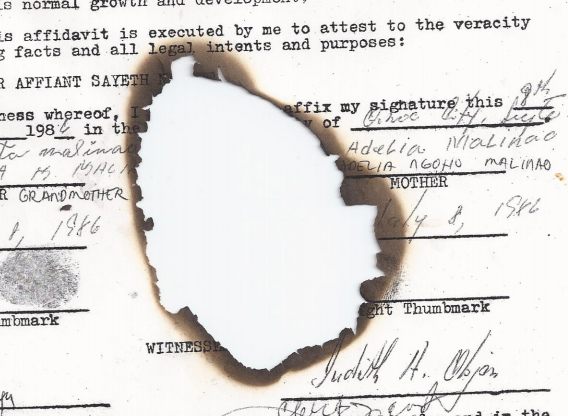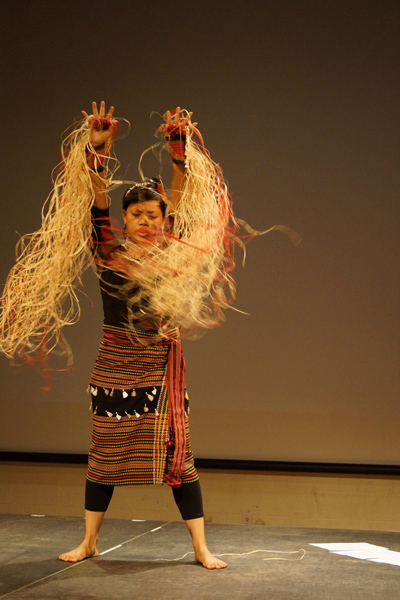How do you write yourself into existence? Is it possible? I think of Bell’s Theorem in which a particle only exists when it is being observed. The particles react to each other. They react because they are observed. Form – the body – is made up of particles – energy.
If this is so, does a writer only exist when observed? I write to live. I write observations of the world, but those observations are always subjective. So by observing the world I am observing myself. Does that mean I only exist when I am writing? Do I also exist in the time that the work is being read? Do I invent the reader? Do you invent me?
Three Experiments Towards Existence. But then, do we ever really exist?
1. Walking
It starts with walking, but I wonder if most things start with walking.
Walking. Towards Red. The catalyst.
In Spring 2013, in Bhanu Kapil’s Experimental Prose class, we were instructed to walk towards “the most saturated red we could find.” Never before exposed to somatic writing or writing arising from experiments and gestures, I had no idea what she was talking about. My only reference point was a workshop I had taken with Jena Osman on psychogeography, a term defined by Guy Debord. How do we move through a city? Do we always take the same path? How can we interrupt it? Can it be interrupted?
I want to find the space between poetry and prose, between here and other, between continents, but tectonic plates always move.
During my walk, I found the buildings too symmetrical. And the red I remember does not exist. The red I remember is rusted, is hanging on jeepneys, is peeling off the Sibunag sign above a dirt road. I imagine red as tesserae laid in specific places within a mosaic, like the ones half buried beneath volcanic remains. No one remembers the bodies there.
My wanting is not the grid’s wanting.
Perhaps interruption is about standing upright. An upright body can surrender to gravity – to writing – without fear of falling over. And then you can become aware of even the most minute pulses of energy. So that the “embodiment of the line both opens and grounds the largely dormant evolutionary energies in the human body” (Will Johnson, Soma and Dharma workshop, Naropa University, 2013). When a thought arises, where in your body do you tense? The degree of pain is equal to the degree with which you resist.
Don’t resist. Instead, walk. What happens when a sentence moves? What is left behind? Walk until you have no reference point. “The mind with no reference point does not resolve itself, does not fixate or grasp,” writes Pema Chödrön.
2. Destruction
There are two kinds of secrets:
1) The insignificant things, gossip that spreads like wildfire. “Gossip is the glue of society,” says Chögyam Trungpa Rinpoche.
2) Those we cling to like breath, to save ourselves from dying, that make us feel wretched and lonely. This is the genuine heart of sadness. These are the secrets we don’t dare utter.
There comes a point when the text becomes stagnant and needs to break open. How to let go of the secrets we cling to? How to write them out of your body? I took a document – the affidavit of waiver – the only thing I have with my birth mother’s thumbprint and handwriting on it – that signs me over to child welfare.
I want to burn the Deed of Voluntary Surrender. To obscure the signature: the thumbmark. Relegate it to ashes. Bury the ashes in the greenhouse. Next to the lemon tree. Lemons remove toxins from the blood. They purify the body.
I use a votive candle from the shrine. My heart contracts and my body clenches. It takes awhile to catch, but then the flames quickly burn through the paper. The imprint of my mother’s dirt and flesh peels away.

In Fall 2013, I attended the 2nd International Babaylan Conference in Westminster Woods in California. I attended a workshop during which we had to introduce ourselves through song and dance. Through movement. When it was my turn to stand in the middle of the circle, I could feel the anxiety, the pulsing. The drum.
Anger rises up from the root of me.
A moment of absolute horror. Peripheral vision disappears. Flames sharpen. I do not want ashes. I want to dance the hostility of the universe. Blow out the flames with three deep dragon breaths. I want to dance the shame from my body. They keep burning. The edges curl. I want a doorway. Throw the paper on the wet ground. Stomp on it. I want to dance out of this earth and into another. Muddy footprints splatter. Arms above head like jungle crow wings. I want to be the one who controls where I am going. Place the paper on top of a blank notebook. I want to dance myself into a new story. Burnt flakes carry off in the wind. A place where I only know of ordinary things.
3. Dance
What does your text want? The text wanted to be performed; it didn’t care about my stage fright.
I want to dance the hostility of the universe. I want to dance the shame from my body.
Deliberately, I put on my native Kalinga clothes. Jewelry. My purpose for dancing was written into my piece: “I want to dance the shame from my body.” But as I started to move – awkward at first – I realized it was more than that; I wanted to be witnessed. Shame is something put on you by society, by others. And we take it – own it – and mistake it for guilt. I pried it from me. And I wanted others to see me scrape it out. What does it mean to be witnessed?

The next day I noticed a large red scratch mark starting just under my right armpit going down along the side of my right breast to the bottom of my ribcage. Did this happen during the performance? I don’t remember. The performance was Babaylan-inspired and trance-like. The room fell away. There was an edge. What if I gave a voice to this edge? Was this edge – an ecotone – a sharp boundary line or a gradual blending? A complete cessation of movement, or suddenly, instead, the ability to move?
After, I had to reorient myself. When I did, I found I was facing a new direction. I found I was awake.
Who were you before you went to sleep? Who will you be upon waking?